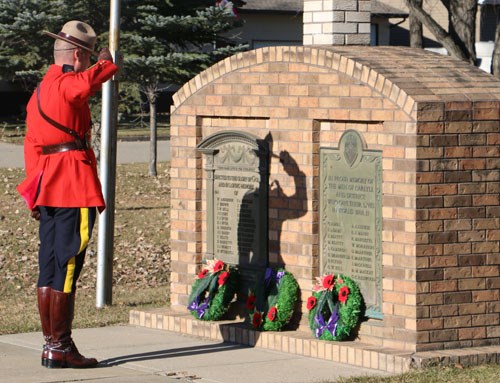“They shall not grow old, as we that are left grow old, age shall not weary them, nor the years condemn. At the going down of the sun, and in the morning, we shall remember them.”
The Carlyle Branch of the Royal Canadian Legion hosted the annual Remembrance Day ceremony in town on Thursday, Nov. 11, at 10:45 in the gymnasium of Carlyle Elementary School.
Together those in attendance remembered those that have been lost in World War I and World War II, with roll calls being named, while words of remembrance were also said for those that have served in the Korean War, on peace keeping missions with the United Nations, and those involved with the war in the Middle East.
A total of 21 wreaths were laid in remembrance and in memory of individuals: Government of Canada, Government of Saskatchewan, Royal Canadian Legion, WWI, WWII, United Nations/NATO, Our Heroes of Afghanistan, Veterans who returned and have since passed on, Town of Carlyle, R.M. #63, RCMP, Cadets, Knights of Columbus, Lions, Carlyle Elementary School, Happy Gang, Crescent Point, Chamber of Commerce, Cornerstone Theatre, and in memory of Bessie and Claire Reid, Sgt. Don Simons, and Nelson Dunn.
Officiating this year was Sister Lucille who spoke of peace.
Jesse Twietmeyer trumpeted “The Last Post” and “The Reveille.” “The Last Post” is played to signify the end of a military day, but it symbolizes more than just that, it is played at military funerals to indicate a soldier has been laid to rest and is also played in honour of all soldiers on Remembrance Day.
Following two-minutes of silence “The Reveille” is played. This song is to wake soldiers beginning their day in military culture, but at Remembrance Day it once again signifies more: “At the going down of the sun, and in the morning, we shall remember them.”
Dianne Twietmeyer read the poem “In Flanders Fields,” written by Lieutenant Colonel John McCrae over 100 years ago.
Guest speaker this year was Staff Sergeant Darren Simons of the RCMP. Simons spoke of the history of the RCMP in serving Canada as a paramilitary force. They served during the Northwest Rebellion, Boer War, squadrons were sent overseas in 1914 and 1918, while a Provost Corps was formed by the RCMP in 1942 serving in WWII as well.
“Personally I am a Canadian army veteran, I didn’t serve overseas, I didn’t have to face what others faced. But, my father was a 30 year veteran of the Provost Corps Military Police,” Simons explained.
He spoke of the sacrifices, how when his father served in Cypress, his family was left at home corresponding only by letter. As infants though, he and his brother don’t remember his absence, but his father and mother did. When he and his brother were older, they noticed. They corresponded by letter and HAM radio, it wasn’t perfect, but they got to hear the their father/husband’s voice, which meant a lot to them.
When the father was sent to Germany, this time the family went with him. It was here that Staff Sargeant Simons joined the military, spending the first two weeks of his time in the Canadian military in Germany. Staff Sargeant Simons was sent back to Canada for training and he corresponded with his family by letter and – if he could convince the operator to talk – via radio.
The soldiers today have video calls and phone calls, but it’s not the same as being in person. Veterans from the World Wars and the Korean War only communicated with their family via letters.
“They didn’t come quickly,” Staff Sargeant Simons said. “Families would send letters and packages, but sometimes their loved ones would no longer be alive and the packages would arrive days, weeks, months later. Regiments would receive and share these packages that were sent, especially around Christmastime.”
As the service concluded at Carlyle Elementary School the Colour Party paraded to the Cenotaph in town where three wreaths were laid: one for World War I and World War II veterans, one for all veterans who have returned from war, and one for UN/NATO members.




